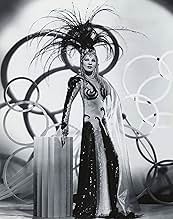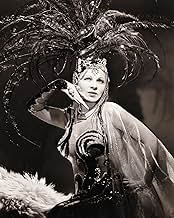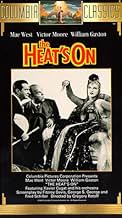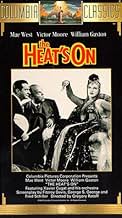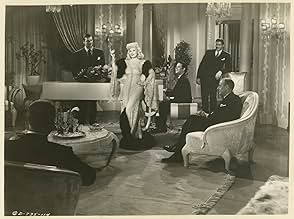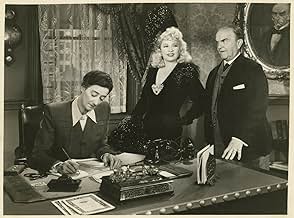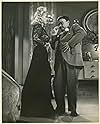When his biggest star joins a rival's show, a Broadway producer bluffs and schemes to get her back.When his biggest star joins a rival's show, a Broadway producer bluffs and schemes to get her back.When his biggest star joins a rival's show, a Broadway producer bluffs and schemes to get her back.
Leon Belasco
- Shore - the Agent
- (uncredited)
Beatrice Blinn
- Babette
- (uncredited)
Featured reviews
An attempt to remake a wartime musical in the old Busby Berkeley style. But Mae West was 50 years old and barely moves or sings; her sharp tongue has also seen better days. Better still is Victor Moore, who, despite his 67 years old, is much more entertaining and active than the popular diva.
The other saving graces are the appearances of singers Joana Thorsen and especially Hazel Scott, not to mention the participation of Xavier Cugat and, above all, his Cuban jazz orchestra, giving the film a picturesque touch.
A weak script, a lightweight, low-budget production, far from the extravagances of Busby Berkeley, this film is mere cheap entertainment, meant to distract viewers during the difficult times of war.
Also noteworthy is the appearance of a young Lloyd Bridges, in a supporting role.
The other saving graces are the appearances of singers Joana Thorsen and especially Hazel Scott, not to mention the participation of Xavier Cugat and, above all, his Cuban jazz orchestra, giving the film a picturesque touch.
A weak script, a lightweight, low-budget production, far from the extravagances of Busby Berkeley, this film is mere cheap entertainment, meant to distract viewers during the difficult times of war.
Also noteworthy is the appearance of a young Lloyd Bridges, in a supporting role.
Broadway star Fay Lawrence (Mae West) wants out of her contract with producer Tony Ferris (William Gaxton). She can do it if the show does badly. A society foundation shuts them down and she jumps to rival Forrest Stanton. Tony is willing to do anything to get her back including using the same foundation and its hapless vice president Hubert Bainbridge (Victor Moore) who wants to help his niece's performing ambitions.
This is Mae West's last theatrical release before making a semi-return some three decades later. She delivers her style of comedy with less sexuality. There is some music. The songs may be appealing to some. For most of this, the lead character is actually Ferris. He's not that compelling or appealing with all his scheming. If this was written by Mae West, she would probably be the lead from the start. She does take over in the last act and that's a good section. If only the movie has more of those.
This is Mae West's last theatrical release before making a semi-return some three decades later. She delivers her style of comedy with less sexuality. There is some music. The songs may be appealing to some. For most of this, the lead character is actually Ferris. He's not that compelling or appealing with all his scheming. If this was written by Mae West, she would probably be the lead from the start. She does take over in the last act and that's a good section. If only the movie has more of those.
At 49, Mae West appeared in this bagatelle produced and directed by her friend, Gregory Ratoff, who needed a name actor to justify the production, but the main character is a hapless bumpkin, well played by Victor Young. Nearly three decades passed before she appeared in another movie. Even more odd was the brief career, as an actress, of pretty, charming Mary Roche, who played Young's niece, although she went on to work as a hair stylist on eight features, three of them very important ones, beginning with "On the Waterfront" (1954). This story of an attempt to put on a Broadway show goes in one ear and out the other, except for Xavier Cugat and his orchestra and the amazing piano playing of Hazel Scott, who even plays two pianos at once.
Turner Classic Movies just unearthed this turkey from their vaults and, being a fan of Mae West (though not an avid one), I thought I'd give it a whirl. Big mistake! (i.e., Big disaster!) After it had unspooled, TCM's host, Robert Osborne, revealed that producer-director Gregory Ratoff had somehow obtained Mae's signature on a contract to appear in this film without her seeing a completed script. When she did get an astonished look at what she was supposed to headline, she was "furious" according to Osborne, and promptly went to work rewriting most of her scenes, adding a few (but not enough) of her trademark witticisms.
The story is more than silly and takes little advantage of Miss West's star power, and, except for Hazel Scott's interpolated production numbers, there's almost no one else in the cast to match Mae's wattage. But she looks great, slinking around in Walter Plunkett's fancifully fantastic creations and Franz Planer's glossy black-and-white cinematography makes the most of the second-tier production values typical of a Columbia Pictures programmer.
Poor Victor Moore is required to portray a pathetic boob, intimidated by a battleaxe of a sister, quite effectively embodied by one Almira Sessions. The ingénue, played by Mary Roche, probably didn't elicit many wolf whistles when this dud was shown to the troops during WW II; Lloyd Bridges has a really small role as her swain (in uniform, of course); and there's an actor named Lester Allen, playing a character appropriately called Mouse Beller, who could only be cast in a role with that moniker.
Mae West quit performing before the cameras (going back to the stage and touring with her fabled nightclub act) and didn't make another picture until "Myra Breckenridge" in 1970 (and she was arguably the best thing in that crazy curiosity). This one is only for those fans who want to get a look at what Hollywood thought it could get away with during the wartime years.
The story is more than silly and takes little advantage of Miss West's star power, and, except for Hazel Scott's interpolated production numbers, there's almost no one else in the cast to match Mae's wattage. But she looks great, slinking around in Walter Plunkett's fancifully fantastic creations and Franz Planer's glossy black-and-white cinematography makes the most of the second-tier production values typical of a Columbia Pictures programmer.
Poor Victor Moore is required to portray a pathetic boob, intimidated by a battleaxe of a sister, quite effectively embodied by one Almira Sessions. The ingénue, played by Mary Roche, probably didn't elicit many wolf whistles when this dud was shown to the troops during WW II; Lloyd Bridges has a really small role as her swain (in uniform, of course); and there's an actor named Lester Allen, playing a character appropriately called Mouse Beller, who could only be cast in a role with that moniker.
Mae West quit performing before the cameras (going back to the stage and touring with her fabled nightclub act) and didn't make another picture until "Myra Breckenridge" in 1970 (and she was arguably the best thing in that crazy curiosity). This one is only for those fans who want to get a look at what Hollywood thought it could get away with during the wartime years.
Although Mae West receives first billing, she is not on screen long enough to make this misfire worth seeing. Even when she is on display and looking svelte and glamorous at 50, her lines lack the double-entendres and sly delivery of her best work. The silly goings on in this back-stage "comedy" revolve around financing a theatrical production with money from a blue-nose group whose goal is to suppress such shows. The plot is muddled at best, ridiculous at worst, and the cast lacks either a romantic lead such as Cary Grant or a comic like W.C. Fields for Miss West to play off. The production numbers for the most part are forgettable, even when Mae West delivers the songs. The one exception is the dazzling piano playing by Hazel Scott. Her number with two pianos is nothing short of astonishing and almost makes the dreck one has to endure before her appearance almost bearable. Unfortunately, Scott has only two numbers, but mercifully the film ends rather abruptly not long after she exits the screen. "The Heat's On" is certainly an ironically mis-titled film considering the heat that West generated in her early work, and the movie is only for die-hard West fans who are interested in seeing everything that she appeared in. Entertainment seekers and non-West fans beware.
Did you know
- TriviaThis was Mae West's final film until Myra Breckinridge (1970) 27 years later.
- GoofsOn a wall of a producer's office is a presumably old publicity shot of Fay wearing an elaborate headdress that she doesn't actually wear until she performs a musical number later in film for an entirely new production staged by rival producer.
- Quotes
Fay Lawrence: [singing] If you want things put in order, Come and see me south of the border...
- SoundtracksI'm Just a Stranger in Town
(1943)
Music by Jay Gorney
Lyrics by Henry Myers and Edward Eliscu
Copyright 1944 by Mills Music Inc.
Performed by Mae West (uncredited) in the show "Indiscretions"
Details
- Release date
- Country of origin
- Languages
- Also known as
- Sinfonías dislocadas
- Production company
- See more company credits at IMDbPro
- Runtime
- 1h 19m(79 min)
- Color
- Aspect ratio
- 1.37 : 1
Contribute to this page
Suggest an edit or add missing content

